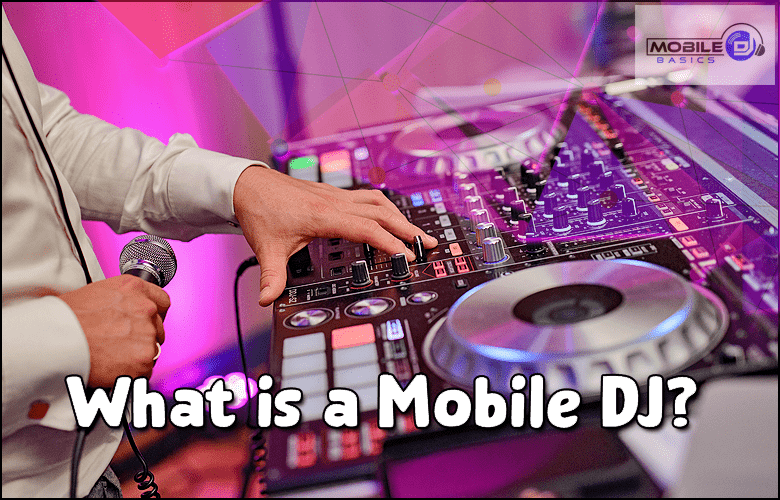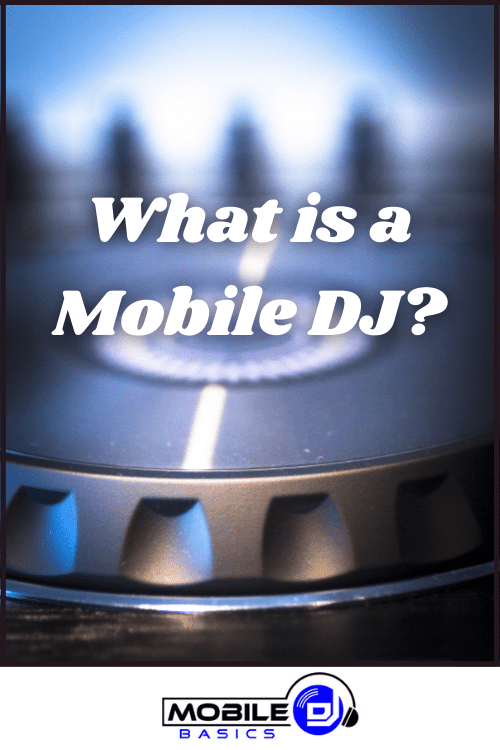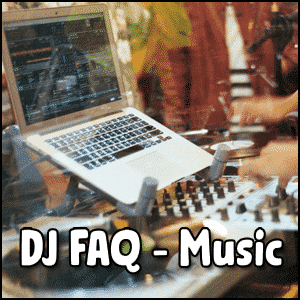
When you think of a Mobile DJ, what comes to mind? For most people, the first thing that pops into their head is someone playing music at a weddings or birthday parties.
What many people don’t know is that mobile DJs have been around for a while and they are becoming more and more popular.
DJing is a fun and creative way to share your love of music with others. DJing can be a great career or hobby, and it’s something that anyone can learn with the right instruction.
In this article, we’ll discuss what Mobile DJing is, how to get started, and some tips for becoming a successful DJ.
What is a mobile DJ?
A DJ, short for disc jockey, is a person who plays music that is either chosen by the DJ, Wedding Couple or requested by the audience.
Mobile DJs can often be found playing different events like school dances, weddings, birthday parties, and other special events.
Mobile DJs, also known as party DJs or wedding DJs, are DJs who travel to their clients’ event location to provide professional DJ services. They potentially play different venues every weekend.
Typically they bring their own DJ gear, including sound system, lighting, and sometimes video equipment.
Some mobile DJs also offer karaoke services – for an additional fee. They usually work with a laptop or other portable equipment, and often have a large collection of music to choose from.
So what does a mobile DJ actually do?
Well, first and foremost, they play music for different events. This means they need to have a large selection of songs to choose from, and they need to be able to mix songs together smoothly.
They also need to be able to deal with difficult clients or situations, take requests, and they need to be able to DJ for a wide range of audiences.
A good Mobile DJ also need to be able to set up and break down their DJ equipment quickly and efficiently.
This means they need to have a good understanding of how their equipment works, and they need to be able to troubleshoot any problems that may arise.
How do you become a mobile DJ?
If you’re interested in becoming a mobile DJ, there are a few things you need to do. First, you need to make sure you have the right equipment.
This includes a laptop or other portable media players, DJ software, and speakers. You’ll also need a DJ controller if you want to be able to mix songs together.
Next, you need to build up your music collection. This means buying or downloading a wide variety of songs, and organizing them into easy-to-use libraries.
Finally, you need to practice, practice, practice. This means mixing songs together, learning how to use your DJ software and DJ controllers, and honing your skills as a DJ.
If you follow these steps, you’ll be well on your way to becoming a successful mobile DJ. Just remember to have fun, and don’t be afraid to experiment.

DJing Full Time vs Part Time
So, you want to start a mobile DJ business. DJing is a great way to make money and have fun at the same time. But, before you quit your day job, there are a few things you should consider.
First, do you have the financial resources to start a mobile DJ company? DJ equipment is not cheap, and you’ll need to reinvest a significant portion of your earnings back into the business to keep it running.
Additionally, do you have the time to dedicated to DJing full-time? If not, you may want to consider starting as a part-time DJ. That way, you can keep your day job while you get your business off the ground.
Finally, do some research on your local market. Are there already a lot of DJ companies in your area? If so, you’ll need to differentiate yourself in order to succeed.
Starting a DJ company is a big decision, but if you do your homework first, it can be a very rewarding experience.
How many hour does a Mobile DJ Work?
A self employed DJ typically work about 10-15 hours per week. This includes time spent planning for events, setting up equipment, and traveling to and from gigs.
DJing is often considered a part-time job, as most Mobile DJs have other sources of income.
However, some DJs may work more than 20 hours per week if they are DJing full-time.
The amount of work required also varies depending on the type of event.
For example, DJing a wedding may require more time for planning and preparation than DJing a school dance.
Ultimately, the amount of work a DJ puts in each week depends on the DJ’s schedule and the demands of the events they are booked for.
What is the difference between a mobile DJ and a club DJ?
DJing has come a long way since the days of simply playing records at a party.
Today, DJing is an art form in its own right, and there are many different types and approaches to DJing.
One important distinction is between these two types mobile DJs and club DJs.
Mobile DJs typically work for private events such as weddings, school dances, corporate events or corporate parties. A mobile DJ is a DJ who travels to their clients’ event venues to provide DJ services.
They set up their own equipment at the venue and play music for the duration of the event.
Some mobile DJs also work with wedding planners or event coordinators, helping their clients to choose the right music for their event and providing other services to ensure that the event runs smoothly.
Club DJs, on the other hand, typically play one specific style of music in a club setting. They often use turntables, mixers and DJ software for to mixing tracks, and club DJs use special effects, strobe lights and other lighting to enhance the dance floor experience.
Club DJs need to be familiar with the latest trends in their genre of choice, and they must be able to read the crowd and keep the crowd dancing all night long.
Club gigs usually use the house PA System. Club DJs usually do not need to own as much DJ gear and Mobile DJs.
How do DJs get mobile gigs?
There are a few ways to get mobile DJ gigs. The first is to network with other mobile DJs and people in the music industry. This can be done by attending events, conferences, and meetups.
You can also connect with Mobile DJs and others online, through social media or DJ forums.
This is a good way to learn from other DJs. The best way to learn to to actually go out with other DJs and see what they do at their events.
Another way to get mobile DJ gigs is to promote yourself and your Mobile DJ business. This can be done by creating a website or blog, and by making sure your name is listed in online directories.
You can also distribute flyers and business cards, and create Youtube or TikTok videos of your services.
Finally, you can try to get gigs through word-of-mouth. For the most part, this means letting your friends and family know that you’re a Mobile DJ, and asking them to spread the word.
This is a good place to start. DJing your friends weddings will help you get some mobile DJ experience. I started with house parties and eventually weddings.
By following these tips, you should be able to get wedding DJ gigs. Just remember to network, promote yourself, and practice your craft, and you’ll be sure to succeed.
Tips for DJing in front of an audience
DJing can be a fun and creative way to share your love of music with others, but it can also be nerve-wracking to DJ in front of an audience for the first time.
If you’re feeling nervous about DJing in front of an audience, here are a few tips to help you make the most of your experience:
- 1. Choose the right music. The first step is to choose the right music for your audience. If you’re not sure what type of music they like, ask them ahead of time or try to gauge their reaction to the songs you play during your set. Play the music and adapt.
- 2. Set up your equipment properly. Make sure your equipment is set up properly before you start your set. This includes making sure your speakers are positioned correctly and that your controller is working properly.
- 3. Make sure you’re prepared. Before you start mobile DJing, make sure you have a plan for what you’re going to play. This means creating a set list or at least having a general idea of the songs you want to play. Are you background music or the main party. Ask and Find out ahead of time.
- 4. Know your audience. Before the event, take some time to learn about the people who will be listening to your set. What kind of music do they like? What is the age range of the crowd? What is the atmosphere of the event? Knowing your audience will help you choose the right songs and play them in the right order. Most DJs will ask these questions before the get to the venue and press play.
- 5. Be prepared for anything. Mobile DJing can be unpredictable, so it’s important to be prepared for anything that might happen. This includes having a backup plan for your equipment in case something goes wrong and being able to troubleshoot any problems that might arise.
- 6. Relax and have fun. The most important thing to remember when DJing is to relax and have fun. If you’re having a good time, chances are your audience will too. So take a deep breath, relax, and enjoy the music.
Common mistakes made by Mobile DJs
Good DJs are constantly under pressure to perform. Not only do they have to please a crowd, but they also have to keep the party going non-stop.
As a result, it’s no surprise that Mobile DJs sometimes make mistakes.
Not knowing your equipment
One of the most common mistakes made by DJs is not knowing their own equipment.
If you don’t know how to use your DJ controller or turntables, it will show in your performance. take the time to learn about your equipment and practice using it before you play in front of an audience.
Not knowing your music
Another mistake that traditional DJs make is not knowing their music well enough. If you don’t know the songs you’re playing, it will be difficult to mix them well.
Take the time to listen to the songs you’re planning to play and familiarize yourself with them before your set.
Not having a plan
One of the worst things you can do as a mobile DJ is not have a plan for your set. If you don’t know what songs you’re going to play or how you’re going to mix them, it will be difficult to create a cohesive set.
Before you start DJing, take the time to create a set list or at least have a general idea of the songs you want to play.
Not being prepared
Another mistake that most traditional DJs make is not being prepared for their sets.
This includes not having a backup plan for their equipment in case something goes wrong and not being able to troubleshoot any problems that might arise.
By being prepared, you can avoid these potential problems and have a successful mobile DJ set. Before your next gig make a plan.
What skills do you need to be a Mobile DJ?
DJing is a lot more than just playing songs. To be a successful mobile DJ, you need to have a wide range of skills, including everything from booking shows to getting paid.
Perhaps the most important skill for a wedding DJ is communication. After all, it’s your job to get people moving and grooving on the dance floor. That means being able to read the crowd and adjust your set accordingly.
You also need to be able to work well with other people, as you’ll often be collaborating with other DJs and Brides and Grooms.
Of course, you also need to have a deep knowledge of music and an ear for what will get people moving.
If you’ve got the passion and the skills, then mobile DJing could be the perfect career for you.
How to select the right music for your event
DJing is an art form that requires both talent and DJ experience. When it comes to selecting the right music for your event, there are a few things to keep in mind.
First, consider the overall tone and atmosphere you want to create. If you’re hosting a formal gathering, you’ll need to choose music that is appropriate for the occasion.
Similarly, if you’re looking to get people up and dancing, you’ll need to select upbeat tunes that will get everyone moving.
Second, think about your guests and what type of music they’ll enjoy. If you’re not sure, play it safe by choosing well-known hits that will please a wide range of listeners.
Country, Hip Hop, Top 40, new music and Classic Hits. There are so many good songs. You don’t need to waste time with boring songs. Join a record pool and keep up with current hits.
Third, As a mobile DJ, it is important to be aware of the type of lyrics that are contained in the songs you are playing. Some songs may have explicit lyrics that you don’t want to play in front of a family-friendly audience.
In order to avoid any awkward or embarrassing situations, it is best to familiarize yourself with the lyrics of each song before you play it.
Finally, Whether you’re looking to create a lively atmosphere or promote a more relaxed vibe, there are plenty of options out there that can help you achieve the effect you’re after.
With a little bit of research and some careful planning, a mobile DJ can select the perfect soundtrack for your next gathering and make sure everyone has a good time.
What makes a successful Mobile DJ
DJing is more than just music – it’s about reading the crowd and knowing what they want to hear.
A successful mobile DJ is able to read the room and play the right songs to get people up and dancing.
Wedding DJs and School Dance DJs are also able to take requests and play the music from a wide range of genres to keep everyone happy.
Communication is key in being a successful mobile DJ – you need to be able to take direction from your client and understand their vision for the event.
By working together, you can ensure that the music will be one of the highlights of a successful event.

Conclusion – What is a Mobile DJ?
Becoming a good mobile DJ is not as hard as one might think. With the right tools and some practice, anyone can start spinning tunes for a living.
Whether you’re looking to become a mobile DJ or just want to be able to rock your next house party, we hope this guide has given you the information you need to know to help you get started.
It can be a lot of fun, and as you get better at it, you may find that you have quite a following. Just make sure that you take the time to learn the basics and practice before taking your show on the road.











